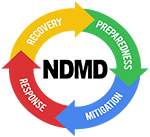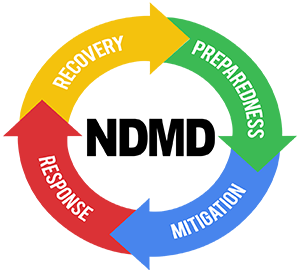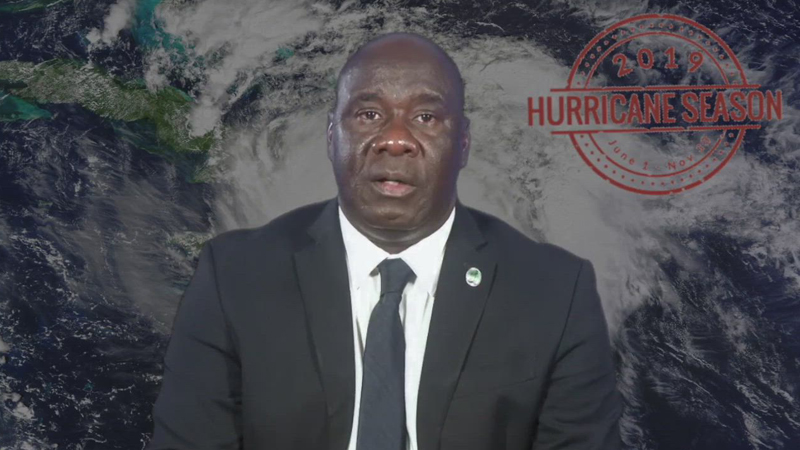NIA CHARLESTOWN NEVIS (June 03, 2019) — The following is an address by Hon. Alexis Jeffers, Deputy Premier of Nevis and Minister responsible for Disaster Management in relation to the 2019 Atlantic Hurricane Season.
My Fellow Citizens and Residents,
I am honoured and privileged as Deputy Premier and Minister responsible for Disaster Management to address you as we have now entered the official start of the 2019 Atlantic Hurricane Season.
As we are aware, this season covers the period of 1st of June to the 30th of November annually. We all know that this period is not a time to take lightly but to be very cautious, and in a state of preparedness.
Watch the address:
Tropical weather systems that include tropical depressions, storms and hurricanes can be devastating, and are becoming more extreme, producing primary hazards such as storm surge, flooding coastal areas, flash flooding from heavy rains, destructive winds, high surf and rip currents.
Strong winds can form dangerous waves which can be a significant hazard to coastal residents and mariners. Deadly rip currents, significant beach erosion and damage to structures along the coastline can result. We are asked to be mindful of these weather events and take the necessary precautionary measures to combat the impact.
On May 23rd 2019, the National Oceanic and Atmospheric Administration (NOAA) announced its predictions for the 2019 Atlantic Hurricane Season.
NOAA is predicting a 70 percent chance of 9 to 15 named storms with winds of 39 miles per hour or higher. Of these, the agency says 4 to 8 could become hurricanes, including 2 to 4 major hurricanes that can reach Category 3, 4 or 5; with winds of 111 mph or more.
The agency predicts a 40 percent chance of a near-normal season, a 30 percent chance of an above-normal season and a 30 percent chance of a below-normal season for this year. To clarify, an average season has 12 named storms, six hurricanes and three major hurricanes.
The impact of Climate Change and Climate Variability is real. Climate change is now affecting every country on every continent. It is disrupting national economies and affecting lives, livelihoods, communities and countries at alarming rates.
Although the evidence suggests weather patterns are changing, weather events are becoming more extreme, and as such, the Nevis Island Administration reiterates its commitment to reducing economic losses from natural disasters as its real developmental priority.
This Administration is supporting the Nevis Disaster Management Department (NDMD), its stakeholders and partner agencies to ensure the reduction of economic losses in the face of disasters. We recognize that in doing so, we will empower communities and families, protect lives and livelihoods.
As the Minister responsible for Disaster Management, I am urging all citizens and residents of Nevis to once again to put yourselves in a position where we are resilient and climate smart.
The Nevis Disaster Management Department has embraced a comprehensive disaster management strategy that focuses on reducing risks and enhancing resilience of our island.
Through the department’s multi hazard campaign, we are continuously being informed of what to do before, during and after specific hazards. Therefore, we are quite informed as to how to prepare for a hurricane.
However, let me take some time to remind you to make or review your family’s emergency plan:
– Ensure that every family member knows the contents of the family disaster plan. Know where the Emergency Shelters are located.
– Ensure that enforcement is made on the disaster plan as it establishes order, improves coordination and decision-making, and reduces anxiety and fear.
– Ensure that an emergency contact list of our police stations, Fire and Rescue Services, healthcare facilities and Disaster Management Department are kept at hand.
– Ensure that we have at least 2-3 gallons of bottled water just for drinking and more for sanitation purposes.
– Our hurricane emergency kits should also include but not be limited to battery powered flash lights, batteries, a family size first aid kit, battery powered or hand crank radio, medication and a whistle or whistles to signal for help.
– Have at least a three-day supply of non-perishable food; ensure that important documents such as passports are stored in a waterproof container or in sealed plastics.
– Visit the Automated Teller Machines (ATM) for cash, and fill up your vehicle with enough fuel.
– Every effort should be made to reduce property damage by retrofitting and reinforcing your roof, windows and doors.
– It would be beneficial if homes can invest in a portable generator, and most importantly keep properties clean.
– Have an extra tank of propane gas stored as well. Review your insurance policies to ensure that you have adequate coverage for your home and personal property.
– Report any damages to your property to the Nevis Disaster Management Department.
I will continuously urge us as residents and citizens, government agencies and business entities to be very decisive in safeguarding our lives and property. These measures will enhance our resilience and that of our physical infrastructure.
The impact of major Hurricanes Irma and Maria of 2017, are stark reminders of the fragility of the economies of Small Island Developing States (SIDS), and as such the Nevis Island Administration continues to provide the necessary support to the Nevis Disaster Management Department to adequately promote a culture of disaster reduction, coordinate preparedness and mitigate any impact the island may experience. This herculean task cannot be achieved without the invaluable support of volunteers.
I am pleased to take this opportunity to salute the hard work, dedication and commitment of our emergency workers who continue to avail themselves in times of crisis. Our first responders, disaster management volunteers, shelter managers, Community Emergency Response Teams (CERT) who continuously provide their time and effort to secure our island in times of emergency is commendable.
In closing, I must remind our citizens and residents that the Hurricane Season should not be taken lightly. Please continue to heed the public advisories issued by the St. Kitts and Nevis Meteorological Offices, the National Emergency Management Agency, the Nevis Disaster Management Department and other related agencies.
We are asked to plan, prepare and protect as we remain cognizant of the need to minimize the negative impacts of climate change, and being able to recover faster after an extreme hurricane and other disasters.
May God bless us and grant us his divine protection on our beautiful island.
I thank you.


